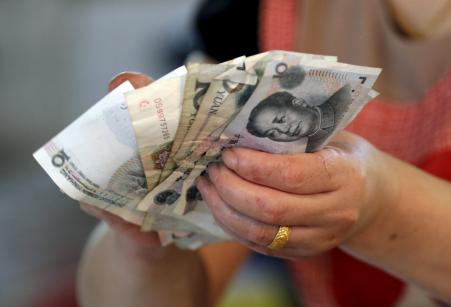By Kukil Bora -
China’s yuan fell to a four-year low in early Wednesday trading, slipping further a day after the country’s central bank devalued the currency to make its exports more competitive and boost sluggish economic growth. The People’s Bank of China (PBOC), which described the move as a one-off step, also sought to reassure markets that the current trend will not lead to a steady depreciation.
On Wednesday, spot yuan dropped as much as 1.6 percent to 6.43 per dollar, its weakest level since August 2011, after the PBOC set its daily midpoint reference weaker than Tuesday's devaluation. The currency fell even further in offshore trades, touching 6.57. And though the central bank pledged to keep the yuan at a “stable” and “reasonable” level, it warned of temporary volatility ahead.
“Indeed, we think it would be unwise to allow a large depreciation at this time, given the sizable capital outflows recorded in the first half of the year,” Craig Botham, emerging-market economist at Schroders (LONDON:SDR), a British multinational asset management company, told the Wall Street Journal. “Entrenching expectations of depreciation would serve only to exacerbate those outflows and potentially destabilize the financial system.”
While a cheaper yuan could strengthen Chinese exports, it will also put pressure on China’s trade rivals, such as South Korea and Japan, to allow their currencies to fall, raising risks of market volatility and a race to devalue currencies in other emerging markets.
“While it is too early to say whether this is the beginning of a sustained devaluation of the yuan, other central banks may be forced to follow suit and that may trigger a fresh round of currency weakening around the emerging world,” Rajeev De Mello, head of Asian fixed income at Schroders in Singapore, told Reuters.
A Bank of Korea official told the Journal that the yuan's devaluation is "not a simple but a complex issue that can have simultaneously conflicting ramifications on Korea," and that the bank would keep an eye on the currency.
Amid fears of a rush to widespread devaluation of competitive currencies and the impact China's move could have on short-term monetary policy moves, the International Monetary Fund welcomed the PBOC’s devaluation of the yuan.
“The new mechanism for determining the central parity of the Renminbi announced by the PBC appears a welcome step as it should allow market forces to have a greater role in determining the exchange rate,” the IMF said, in a statement Tuesday. “The exact impact will depend on how the new mechanism is implemented in practice.”
The U.S. Federal Reserve said that China's currency devaluation is unlikely to distract it from its focus on the domestic economy. At the same time, the U.S. central bank will remain cautious about further competitive devaluations that could send the dollar much higher than its rise against the yuan on Tuesday, and complicate the Fed's outlook on rates, which were widely expected to be hiked in September, before China's move.
“Yuan devaluation is disinflationary as all imports from China become cheaper,” Zhiwei Ren, managing director and portfolio manager at Penn Mutual Asset Management, told the Journal. “There is even less reason to hike in September now.”
However, Peter Hooper, chief economist at Deutsche Bank (XETRA:DBKGn) Securities and a former Fed economist, told Reuters: “I don't see this affecting the Fed decision unless it develops into something that roils markets substantially,” adding: “It adds a little more drag to the economy via net exports and puts a slight damper on consumer prices, but not enough to alter the course of the U.S. economy or labor market significantly.”
The Shanghai Composite Index was down 0.10 percent while the smaller Shenzhen Component index was down 0.38 percent. Hong Kong's Hang Seng index was down 2 percent. The dollar index, which measures the dollar against a basket of currencies, was trading down 0.3 percent.
Other Asian currencies were also reportedly lower on Wednesday, with Indonesia's rupiah and Malaysia's ringgit hitting 17-year lows, while the Australian and New Zealand dollars were at six-year lows, according to Reuters. The Indian rupee was at a two-year low.
